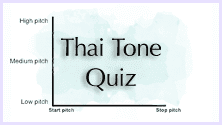ฟ้าหลังฝน : Fáa Lŭng Fŏ’n
ฟ้าหลังฝน มีสิ่งสวยงามเกิดขึ้นเสมอ
หลังวันที่เลวร้าย สิ่งดีๆ จะตามมา
สำนวนนี้ให้กำลังใจในเวลาที่เราทุกข์
Fáa Lŭng Fŏ’n Mee Sìng Sŭay~Ngaam Gèrd~Kûen Sà-mĕr
Lŭng Wun Têe Le_w~Ráay, Sìng Dee~Dee Jà Dtaam Maa
Sŭm~Nuan Née Hâi Gum-lung Jai Nai Way-laa Têe Rao Tóok
sky + after + rain + have + thing + be beautiful + to occur/happen + always
after + day + that/which + be bad, thing + be good/nice + to follow + to come
aphorism + this + to give/for + energy + heart + in + time + that/which + misery
There is always something beautiful after the rain.
After the bad day, good things will come.
This aphorism is an encouragement for the day you feel miserable.
Vocabulary
ฟ้า : Fáa = [noun] sky [noun] blue sky colour หลัง : Lŭng = [preposition] after [noun] back of the body [noun] back part of something ฝน : Fŏ’n = [noun] rain (liquid) มี : Mee = [verb] to have, to own, to possess, there is/are, consist of, contain of สิ่ง : Sìng = [noun] thing (abstract/object) สวยงาม : Sŭay~Ngaam = [quality modifier] be beautiful, be charming, be exquisite, be fine สวย : Sŭay = [quality modifier] be beautiful งาม : Ngaam = [quality modifier] be charming เกิดขึ้น : Gèrd~Kûen = [verb] to happen, to occur, to arise เกิด: Gèrd = [action verb] to be born, to take birth [verb] to happen, to take place, to occur ขึ้น : Kûen = [action verb] to go up, to increase, to rise up, to be up เสมอ : Sà-mĕr = [time modifier] always, regularly ที่ : Têe has many uses but in this lesson it is [link word/relative pronoun] that, which, what, who, where, when, why (used to link words, clauses or sentences)e.g.
คนที่ดี : Ko’n Têe Dee = A person who is good คนที่พูดดี : Ko’n Têe Pûud Dee = A person who speaks nice คนที่พูดดีที่ฉันรู้จัก : Ko’n Têe Pûud Dee Têe Chŭn Rŭu~Jùk = A person who speaks nice which I know of. ฉันชอบอะไรที่ทอมชอบ : Chŭn Chôrb À-rai Têe Tom Chôrb = I like things that Tom likes. / I like what Tom likes. เลวร้าย : Le_w~Ráay = [quality modifier] be bad, be misarable, be evil, be immoral, be wicked เลว: Le_w = [quality modifier] be bad, be immoral ร้าย : Ráay = [quality modifier] be cruel, be vicious ดีๆ : Dee~Dee = [quality modifier] be good, be nice (used when emphasising the good quality of something/action)Grammar: In Thai language, we can repeat a modifier (English: adverb/adjective) or a phrase to emphasise the quality of a modifier. The meaning may change slightly and we may use it in some situation only. The written form when repeating a word or a phrase is ๆ.
จะ : Jà = [tense word] will (any time in the future) (used before a verb) ตาม : Dtaam = [action verb] to follow, to go/com along [preposition] along, among มา : Maa = [direction action verb] to come [preposition] to (away from current location) [tense word] to now, up to now, till now (used after a clause or sentence) สำนวน : Sŭm~Nuan = [noun] saying, motto, aphorism นี้ : Née = [distance modifier used after object/thing/human] this, these นี่ : Nêe = [noun] this thing, these things [distance modifier used after the word place] ที่นี่ : Têe~Nêe = this place, here ( ที่: Têe = [noun] place) ให้ : Hâi = [action verb] to give, to pass on [link word/preposition] for (sense: passing something to someone) [permission verb] to allow, to let (someone do something), to have (someone do something) กำลังใจ : Gum-lung~Jai = [noun] encouragement กำลัง: Gum-lung = [noun] energy [tense word] be/is/am/are ….ing (used in front of a verb) ใจ : Jai = [noun] heart, mind, spirit ใน : Nai = [preposition] in เวลา : Way-laa = [noun] time เรา : Rao = [pronoun] we/us/our/ours ทุกข์ : Tóok = [feeling verb] be distressed [noun] sorrow
By ครูเจี๊ยบ : Kruu Jíab (Thai Style’s head teacher)



